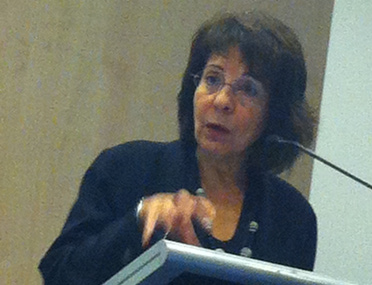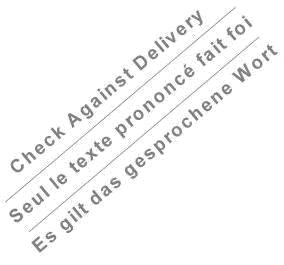Speech at the Baltic Sea Conference

Commissioner Damanaki delivered a keynote address during the opening of the Baltic Sea Conference, taking place this year in Copenhagen, Denmark. The Conference, gathering different stakeholders from the Baltic region, is focusing this year on Blue Growth, Sustainability and Water Industries.
During her visit to Copenhagen, Commissioner Damanaki is also meeting with Mrs Karen Haekkerup, the recently appointed new Danish Minister for Food, Agriculture and Fisheries.

Baltic Forum
Copenhagen, 3 October 2013
Ladies and gentlemen,
Today everybody realizes the huge potential our maritime economies contain, and how important their role is - or should be - in the overall economy. We have to do our best to unleash this potential.
Many of you can remember the start of the European maritime policy back in 2007. Well, it is growing up fast. Big steps have already been made and maritime policy is now an essential part of the European Union's collective work to strengthen our economies, create jobs and protect the marine environment.
With our Blue Growth initiative we are bringing the policy to the next level… to secure Europe's place in the global maritime economy. We look at specific areas where we think there is work to do and opportunities to seize, such as blue biotechnology, ocean energy or maritime tourism. And we provide the best possible operational conditions for businesses.
We estimate that spatial planning alone could bring between 170 million to 1.3 billion euro by 2020 in cost savings in Europe, not to mention the reduction of administrative burden. Marine knowledge should bring further benefits of 500 million euro a year.
We are also making sure that the new European funds, starting next year, have specific openings for actions that support Blue Growth and sea-basin strategies.
We have also worked hard on the reform of the Common Fisheries Policy – and we now have an agreement to change the way we fish and stop the waste of unwanted catches. We have an agreement take a brave step forward towards sustainability, which will increase profits because it will maximize the output from fisheries.
And this is what our reform plan is about: giving a positive spin to coastal economies and ultimately helping economic recovery.
Europe's Maritime Policy and the Baltic Sea Strategy have been cousins since the beginning. It is now vital to extend this relationship to Blue Growth. The Blue economy in this Sea Region is growing at a very rapid pace, and its remaining potential is enormous. Offshore wind energy shows double-digit growth figures; the cruise sector is growing at almost 11%, and aquaculture at over 13%.
I know that much work has already gone into developing specific actions and approaches to Maritime Affairs in this area, notably in the context of the Baltic Sea Strategy, and I want to congratulate you on that. The region ranks first among the innovation and research-based economies in Europe.
The best example I can think of is your effort to reduce ship emissions. You are truly ahead of any other sea basin in this respect. Well done!
The Baltic Sea area has a tradition of working very closely together, be it in the context of the Baltic Sea Action Group or HELCOM.
Throughout the day today, you will be informed about other economic activities areas where the Baltic Sea is at the forefront of cooperation and development. Whether it is its innovation clusters… the BONUS research programme… the pioneering role of the BaltFish forum in regional fisheries management… or innovative projects on renewable energy.
From our side, we have already managed to ensure that the next Research programme – Horizon 2020 – includes a focus on Blue Growth, and I am keen to see the first Blue Growth calls for projects under Horizon 2020 early next year. This should give a nice boost to the already powerful research cooperation under the BONUS programme.
The issue of innovation and technological development will be a major theme for our work next year. It will be the focus of next year's Maritime Day in Bremen.
Another important topic on the agenda today is connectivity. Whether we are speaking of access to the grid for renewable energies or of short-sea shipping or of interconnecting islands and remote areas, the lessons learnt here in the North will provide food for thought in the Mediterranean in the Black Sea, – and vice versa.
Like connectivity, maritime security is also necessary to us all in today's globalised world. It needs to be on our maritime agenda – and not just for a few hotspots. The first step towards security is awareness. And if surveillance and monitoring are done right, not only will we be safer – we will also free up money for investments elsewhere. Here too, I encourage you to keep up with the good work done by this Forum and continue with this vital reflection.
Ladies and gentlemen,
For today's important phase of preparation, we have provided as much material as possible on our take on Blue Growth in the Baltic, as well as on the research we have carried out. Conclusions so far are interesting. But today, we are expecting you to take this reflection forward, at a regional level. It is your input and expertise on your needs, on how to use funding, that will make a difference - for the Blue Growth agenda and for maritime projects. I am hoping for ideas on Blue Growth to bring back home with me, and to propose to my fellow Commissioners.
My objective is that by the end of this year we are able to draw out a series of ideas and proposals on Blue Growth in the Baltic Sea area, and on how to achieve them with the tools at our disposal, from the Baltic Sea Strategy to all the new funding instruments under the Multiannual Financial Framework.
I wish this conference every success.


